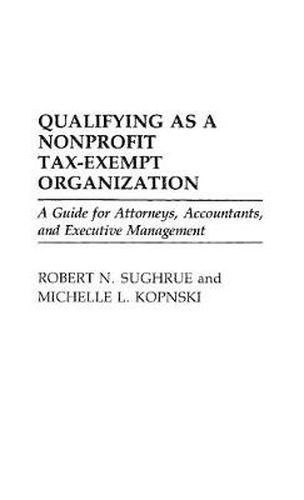Readings Newsletter
Become a Readings Member to make your shopping experience even easier.
Sign in or sign up for free!
You’re not far away from qualifying for FREE standard shipping within Australia
You’ve qualified for FREE standard shipping within Australia
The cart is loading…






Though frequently used interchangeably, the terms tax-exempt organization and non-profit organization do not carry the same legal definition. Non-profit enterprises are those that do not distribute earnings in the form of dividends or distributions, so while all tax-exempt organizations are non-profit, not all non-profit organizations are necessarily tax-exempt. This work provides a comprehensive look at the US federal Internal Revenue code governing tax-exemp status, carefully detailing the criteria specified in the code and related Treasury Regulations. Also outlined are the prescribed procedures for filing for tax-exempt status. Robert N.Sughrue and Michelle L.Kopnski present a thorough discussion of the various types of tax-exempt organizations and the characteristics unique to each. Sections 501©, 521, 527, and 528 of the Internal Revenue Code are closely analyzed, and the organizational tests of 501© (3) institutions are provided. In addition, accounting systems for tax-exempt organizations, internal controls, and reporting requirements are also covered. Among the other topics addressed are unrelated business taxable income, private foundations, financial considerations in tax-exempt and other non-profit organizations, and financial considerations and practical applications. Students and professionals in the fields of finance, investment, accounting, and law should find this work to be a useful reference tool, and academic, public, and law libraries will consider it a worthwhile addition to their collections.
$9.00 standard shipping within Australia
FREE standard shipping within Australia for orders over $100.00
Express & International shipping calculated at checkout
Though frequently used interchangeably, the terms tax-exempt organization and non-profit organization do not carry the same legal definition. Non-profit enterprises are those that do not distribute earnings in the form of dividends or distributions, so while all tax-exempt organizations are non-profit, not all non-profit organizations are necessarily tax-exempt. This work provides a comprehensive look at the US federal Internal Revenue code governing tax-exemp status, carefully detailing the criteria specified in the code and related Treasury Regulations. Also outlined are the prescribed procedures for filing for tax-exempt status. Robert N.Sughrue and Michelle L.Kopnski present a thorough discussion of the various types of tax-exempt organizations and the characteristics unique to each. Sections 501©, 521, 527, and 528 of the Internal Revenue Code are closely analyzed, and the organizational tests of 501© (3) institutions are provided. In addition, accounting systems for tax-exempt organizations, internal controls, and reporting requirements are also covered. Among the other topics addressed are unrelated business taxable income, private foundations, financial considerations in tax-exempt and other non-profit organizations, and financial considerations and practical applications. Students and professionals in the fields of finance, investment, accounting, and law should find this work to be a useful reference tool, and academic, public, and law libraries will consider it a worthwhile addition to their collections.